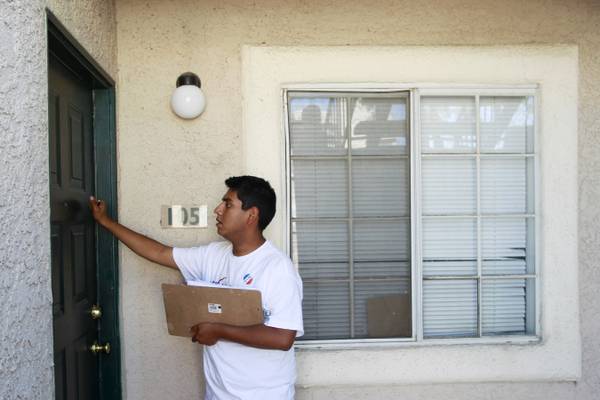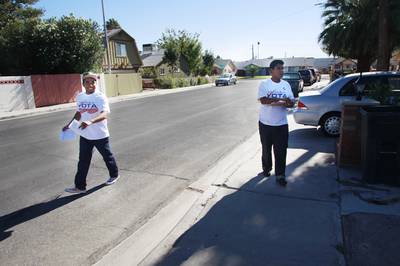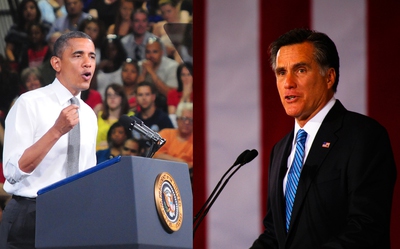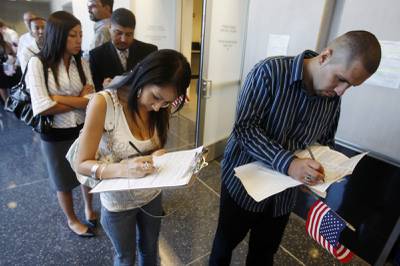Izack Tenorio spends his days splitting time between phone banks and door-to-door canvassing.
The 21-year-old works for Mi Familia Vota, a civic organization geared toward increasing Hispanic voter participation, and on Tuesday, he knocked on doors in a quiet neighborhood near Alta Drive and Decatur Boulevard.
It is noon, and few people were home. At his first stop, he asked for Joann, who is listed at the address as a registered voter. Tenorio is told Joann is sleeping, and he leaves a flier with information about early voting.
Not a single person comes to the door in any of the other homes Tenorio visits on the block. Behind him, two other canvassers from Obama for America also are working the street, knocking on the same doors that were unanswered minutes ago and leaving similar information about where and when to vote.
Political pundits, campaign organizers and national magazines have declared 2012 the year of the Hispanic voter. Voter registration numbers and enthusiasm is up, and now all of those who invested in the wake-up call for this once-dormant demographic want to make sure it does not hit the snooze button on Election Day.
“I worked registering voters in 2008 and 2010, and I’ve seen a lot of enthusiasm this year,” Tenorio said. “There are a lot of groups on the ground in Nevada encouraging Hispanics to get involved, and I’ve seen whole families come into our offices to all register together. I think people are starting to embrace their role and the choice they can participate in. Now, we just have to make sure they take that final step of getting to the polls.”
Mi Familia Vota came into this election cycle with the goal of registering 11,000 voters in Nevada. A few months in, the organization met that benchmark and set another one. That one was broken, too. More than 19,000 voters, the vast majority of them Hispanics, were registered, said Leo Murrieta, state director for Mi Familia Vota.
In a nationwide poll, Latino Decisions found that 8 percent of Hispanic voters had voted early as of Oct. 29 and 87 percent of Hispanic voters said they were “almost certain” to vote. Also, 45 percent of the demographic said they were more excited to vote this year than in 2008, when 84 percent of registered Hispanics voted. Notably, the percentage of Hispanics who said they were certain to vote and more enthusiastic than in 2008 have both increased in the weeks leading up to the election.
In the presidential race, Republican candidate Mitt Romney would like to do better than the 20 percent of Hispanic voters John McCain won in 2008 in Nevada and the 31 percent nationwide. McCain’s numbers were a steep dropoff from the 44 percent of Hispanic voters George W. Bush took nationwide in 2004. The latest Latino Decision tracking poll has President Barack Obama with a 73 to 21 lead among Hispanic voters nationally.
After neglecting the on-the-ground work needed to build support in the Hispanic community for much of the 2000s, the GOP has made a concerted effort this election season to increase engagement.
“The biggest difference in the approach toward Hispanic voters this cycle is the organization and outreach on the GOP side,” said UNLV political scientist David Damore, who added Republicans were targeting small-business owners and social conservatives. “Previously, all the organization was largely on the Democratic side. ... McCain didn’t do anything here, and that’s when you started to really see all the work Democrats had laid over prior election cycles pay off.”
Elsa Barnhill, the Republican National Committee’s Nevada director of Hispanic outreach, adhering to the GOP’s national strategy, immediately started work on a network of bilingual volunteers when she took the post in April.
“This year we’ve had a really heavy focus on voter contact,” Barnhill said from an east Las Vegas Romney campaign office that was opened in September with a visit from Craig Romney, the Spanish-speaking son of the former Massachusetts governor.
“It seems kind of simple, but you’d be surprised. In prior years, Hispanic outreach actually, a lot of times, consisted of attending events, festivals in the community. Of course I’m not downplaying the importance of those. We’ve certainly done those things, as well, this year, but we’ve focused really aggressively on contacting all Hispanic voters,” said Barnhill, who set up a volunteer staff of 400 bilingual volunteers who could staff phone banks, contact voters and be liaisons for Romney in the community.
At a recent Romney event, Hispanic supporters filled out postcards in Spanish explaining why they supported the GOP candidate. Those postcards are being mailed this week to voters who need to be swayed.
“As far as the Republican Party goes, each cycle we’ll show we’re committed to winning the Latino vote, to swaying people and to having them listen to our side. And you’ll see more and more involvement every cycle,” Barnhill said, noting the RNC started running Spanish-language ads as early as January.
Much like the GOP strategy that relies on tried-and-true personal interactions, the Obama campaign and its supporters are placing the most importance on real contact.
“It’s all part of the model that Obama for America started in 2008,” said Andres Ramirez, president of political consulting group Ramirez Group and the vice chair of the Democratic National Committee’s Hispanic Caucus. “It’s not just having all of the offices across the country; it’s also having them staffed with volunteers making phone calls and knocking on doors. The evaluation metric of campaigns is not doors knocked on but the number of conversations you’ve had. That’s the single-most valuable metric.”
Both sides have flooded Spanish-language media with advertisements, setting records for spending in the process.
According to analysts Kantar Media, more than $4 million has been spent in 2012 in Las Vegas on political ads running on Univision and Telemundo, compared with a combined $600,000 spent on political ads at those two TV stations in 2008.
Ramirez said the campaign had moved to integrate more social media into its outreach efforts as more and more people use services like Twitter and Facebook, but one-on-one interactions still are the bricks with which a winning campaign is built.
Hispanic voters are not just getting attention from the presidential candidates and their respective parties, but several outside groups, as well.
Fernando Romero, president of the Las Vegas civic engagement group Hispanics in Politics and a local coordinator for National Council of La Raza Action Fund’s efforts to register voters, said he believed enthusiasm was equal to 2008 but the increase in political groups had helped cast a wider net.
“I see more organizations being involved on both sides of the aisle,” Romero said. “About four years ago, we didn’t have as many conservative organizations out there that we do now. There’s more of both conservative and progressive organizations, and they’ve been very active in the community.”
In Nevada, all of the outreach has seemingly paid off in the registration numbers. According to an analysis by Ramirez using Clark County Election Department data for April to October, the number of registered voters with Spanish surnames has increased 37 percent this year compared with an overall registration gain of 26 percent.
Voters with Spanish surnames are turning out to early voting stations in record numbers, but so are all Nevadans. It is unclear if Nevada’s Hispanics will surpass the 15 percent of the electorate they have constituted in the most recent elections, but the raw numbers will be higher.
All of the analysts and campaign organizers agree the Hispanic electorate is here to stay as an influential force.
“I think is going to be an ongoing trend,” Romero said of the rapid growth of the Hispanic electorate and its influence in politics. “Hispanic voters are realizing that their vote does count. We are getting more involved and are becoming more of a factor in the outcome of elections every year. I believe it’s going to stay that way. ... More and more groups are reaching out and, as a relatively young demographic, the number of Latinos voting will only grow. Our interest will not wane.”





Join the Discussion:
Check this out for a full explanation of our conversion to the LiveFyre commenting system and instructions on how to sign up for an account.
Full comments policy